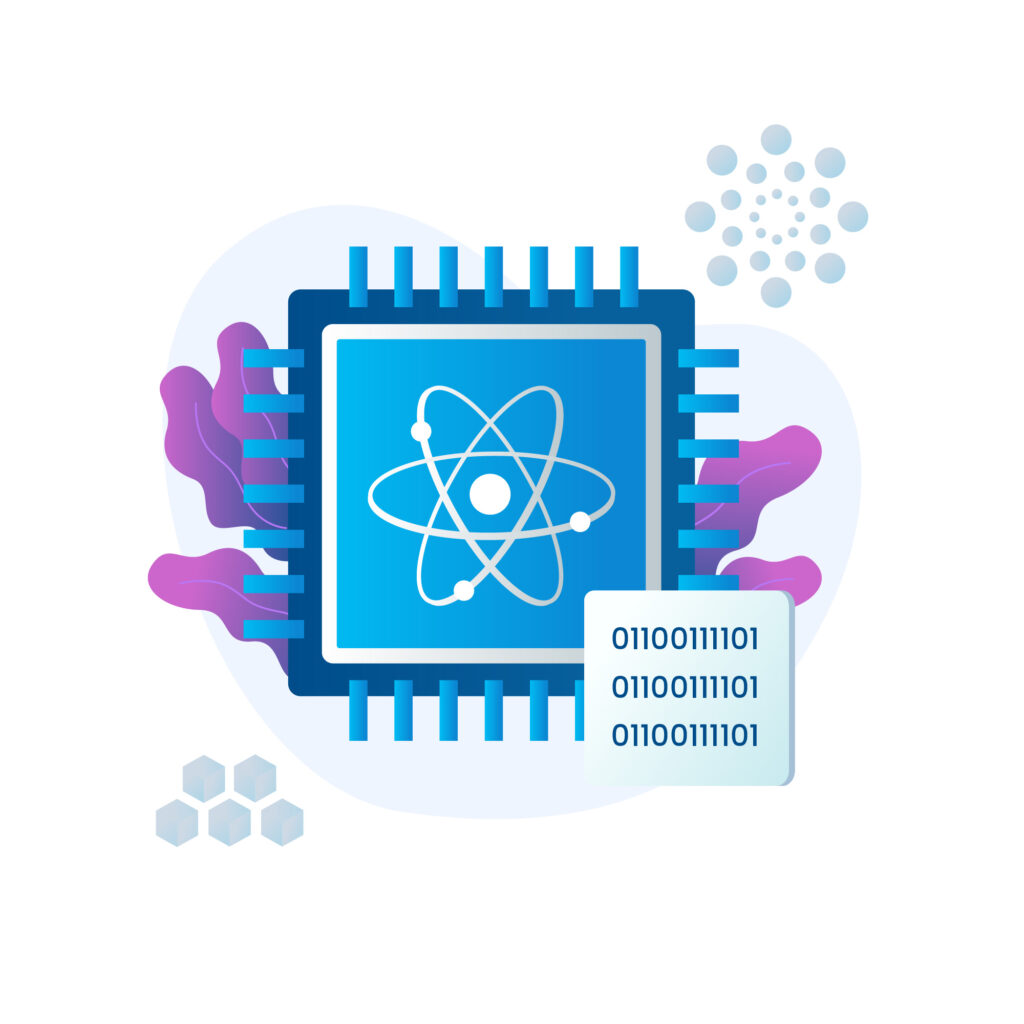Introduction
Quantum computing is no longer just a concept confined to the realms of science fiction; it has rapidly emerged as a groundbreaking field with the potential to change the way we compute, solve problems, and process data. At its core, quantum computing leverages the strange and complex principles of quantum mechanics to perform calculations that classical computers simply cannot match. Unlike traditional computers, which rely on binary digits (bits) to represent data in the form of 0s and 1s, quantum computers use quantum bits, or qubits, that can exist in multiple states simultaneously. This unique property allows quantum computers to explore vast amounts of possibilities in parallel, making them exceptionally powerful for certain types of problems.
From revolutionizing industries like healthcare and finance to enhancing cryptography and artificial intelligence, the applications of quantum computing are virtually limitless. However, despite its enormous promise, quantum computing is still in its early stages, with a number of obstacles such as stability, error correction, and scalability. In this article, we will delve into the world of quantum computing, exploring its core principles, the advancements that have been made so far, the hurdles it must overcome, and the incredible future it promises.

What is Quantum Computing?
Quantum computing is founded on the concepts of quantum mechanics, a branch of physics that studies particle behavior at the atomic and subatomic level. Classical computing processes data in bits, which can be either 0 or 1. Quantum computers, on the other hand, use quantum bits, or qubits, which can exist in multiple states at once due to a phenomenon called superposition. This enables quantum computers to do complex calculations much faster than traditional computers.
The Core Principles of Quantum Computing
To understand quantum computing better, it’s essential to grasp some key concepts that make it possible:
1. Superposition
A qubit’s ability to exist in many states at the same time is known as superposition. While a classical bit can only be in one of two states (0 or 1), a qubit can represent both 0 and 1 at the same time. This allows quantum computers to do several calculations simultaneously, significantly enhancing their processing capability.
2. Entanglement
Quantum entanglement is another critical phenomenon in quantum computing. When two qubits become entangled, the state of one qubit becomes directly related to the state of the other, regardless of the distance between them. This allows quantum computers to perform highly complex computations that would be impossible with classical systems.
3. Quantum Interference
Quantum interference refers to the way qubits interact with each other during computation. By manipulating interference patterns, quantum computers can amplify the probability of correct answers while minimizing incorrect ones, leading to more efficient computations.
4. Quantum Tunneling
Quantum tunneling occurs when particles pass through energy barriers that would be insurmountable in classical physics. In quantum computing, this property can be used to explore multiple solutions to a problem simultaneously, speeding up the process of finding an optimal solution.
How Quantum Computing Differs from Classical Computing
Classical computers utilise bits to encode data as either 0 or 1, whereas quantum computers employ qubits, which can be in several states at once. This enables quantum computers to address specific problems much more quickly than traditional systems. For instance, quantum computers can handle complex simulations, optimize large datasets, and solve cryptography problems more efficiently than classical computers.
Applications of Quantum Computing
Quantum computing holds immense potential across various fields, from healthcare and finance to artificial intelligence (AI) and cryptography. Let’s look at some of the most promising uses of quantum computing.
1. Quantum Cryptography
One of quantum computing’s most important applications is cryptography. Quantum computers can break traditional encryption methods, which rely on the difficulty of factoring large numbers. However, quantum cryptography, using principles like quantum key distribution (QKD), offers a more secure way to protect sensitive information. This makes quantum encryption a critical tool for secure communications.
2. Drug Discovery and Healthcare
Quantum computing can revolutionize the healthcare industry by enabling faster and more accurate simulations of molecular structures. This could lead to breakthroughs in drug discovery, personalized medicine, and disease diagnosis. Quantum computers can model complex molecules and their interactions with unprecedented precision, speeding up the development of new treatments.
3. Financial Modeling
The financial industry stands to benefit greatly from quantum computing’s ability to process large datasets and optimize complex financial models. Quantum computers can simulate financial markets, assess risks, and improve investment strategies, providing more accurate and faster results than classical computers.
4. Artificial Intelligence and Machine Learning
Quantum computing has the potential to advance the development of artificial intelligence (AI) and machine learning. Quantum algorithms can improve data analysis and pattern recognition, leading to advancements in AI-driven technologies like natural language processing, computer vision, and autonomous systems.
5. Optimization Problems
Many industries face complex optimization problems, such as supply chain management, transportation logistics, and energy distribution. Quantum computers can solve these problems much more efficiently by exploring multiple possible solutions simultaneously and finding the optimal one faster than classical computers.
Current State of Quantum Computing
While quantum computing has made tremendous strides, it is still in its infancy. Major tech companies like IBM, Google, and Microsoft are investing heavily in quantum research, and startups are emerging with innovative approaches to building scalable quantum computers. However, developing workable, large-scale quantum computers remains a big issue.
1. Quantum Hardware
Quantum hardware is a major area of work in the quantum computing community. Quantum computers can be classified into numerous categories, which include:
- Superconducting Qubits: This approach uses tiny circuits that operate at extremely low temperatures to represent qubits. Companies such as IBM and Google are driving the drive in this sector.
- Trapped Ions: Another promising approach uses ions trapped in electromagnetic fields to represent qubits. This method has been successful in creating stable qubits for computation.
- Topological Qubits: This theoretical approach involves qubits that are less prone to errors, making them ideal for large-scale quantum computing.
2. Quantum Algorithms
Quantum algorithms are critical for maximizing the power of quantum computers. Researchers are developing algorithms that can solve specific problems more efficiently than classical algorithms, such as Shor’s algorithm for factoring large numbers and Grover’s algorithm for searching unsorted databases.
3. Quantum Software
Just as important as hardware and algorithms, quantum software is being developed to make quantum computing accessible to a broader audience. Platforms like IBM’s Qiskit and Google’s Cirq allow researchers and developers to write quantum programs and run them on real quantum computers.
Challenges in Quantum Computing
Despite quantum computing’s immense promise, a number of hurdles must be overcome:
1. Quantum Decoherence
Quantum systems are highly susceptible to noise and interference, which can cause qubits to lose their quantum state. This phenomenon, known as decoherence, is one of the main obstacles in building stable, error-free quantum computers.
2. Scalability
Quantum computers need a large number of qubits to perform meaningful computations, but current quantum systems are limited by the number of qubits they can handle. Building scalable quantum computers that can process thousands or millions of qubits is a significant technical challenge.
3. Quantum Error Correction
Due to the sensitivity of qubits, quantum error correction is critical for assuring reliable computation. Developing error-correcting codes that can handle the noise and imperfections in quantum systems is a major research focus.
4. High Costs
The development of quantum computers requires significant financial investment. Quantum hardware is expensive, and the technology is still not cost-effective for widespread use. As the field advances, we can expect the costs to decrease, but for now, quantum computing remains a niche technology accessible to only a few well-funded organizations.
The Future of Quantum Computing
Looking ahead, the future of quantum computing is incredibly promising, with the potential to transform nearly every sector of society. Although the technology is still in its early stages, researchers are making rapid progress in overcoming the challenges that have historically limited its scalability and efficiency. As quantum hardware continues to improve, and more sophisticated algorithms and error correction techniques are developed, quantum computers are expected to become more accessible and powerful. This will open up a whole new world of possibilities for industries across the globe.
In the coming years, quantum computing may catalyze breakthroughs in fields such as climate modeling, where it could help simulate complex environmental systems with unprecedented accuracy, aiding efforts to address climate change. In space exploration, quantum computers could enhance our ability to analyze vast amounts of data from distant planets and stars, potentially unveiling new insights about the universe. Additionally, advancements in quantum machine learning and artificial intelligence may lead to more advanced, faster, and efficient AI systems, revolutionizing everything from healthcare to autonomous driving.
As quantum computing matures, it has the potential to unlock a new wave of innovation, enabling discoveries and solutions to problems that are currently beyond the capabilities of classical computers. The future of quantum computing is indeed bright, offering transformative possibilities that will shape our world for decades to come.
Conclusion
Quantum computing marks a new era in computing technology. With its ability to solve complex problems at unprecedented speeds, it has the potential to revolutionize industries ranging from healthcare to finance. Although the technology is still in its early stages, the rapid progress being made in quantum research is paving the way for a future where quantum computers will become an integral part of our everyday lives.
As we stand on the brink of this technological revolution, it’s important to recognize both the immense possibilities and the challenges that come with it. Quantum computing promises breakthroughs in drug discovery, enabling pharmaceutical companies to develop life-saving treatments more efficiently. In the financial sector, it offers the tools to optimize portfolios and manage risks with precision previously unimaginable. Beyond these industries, quantum algorithms could solve logistical challenges, enhance AI capabilities, and strengthen cybersecurity measures.
However, with great power comes the responsibility to harness it ethically. The advent of quantum computing raises questions about data privacy, equitable access, and its potential misuse. As governments, researchers, and organizations collaborate to unlock its full potential, there must also be a concerted effort to establish safeguards that prevent its abuse.
In summary, quantum computing is not just a leap forward—it’s a giant step into the future. While its full potential is yet to be realized, its impact will undoubtedly shape the world in ways we can only begin to imagine. By embracing this technology with careful planning and innovation, we can ensure a future that benefits everyone.
FAQs
1. What’s the distinction between classical and quantum computing? Classical computers use bits to represent data, while quantum computers use qubits that can exist in multiple states at once, enabling them to perform computations much faster than classical systems.
2. How do quantum computers solve problems faster than classical computers? Quantum computers can process multiple possibilities simultaneously due to superposition and entanglement, allowing them to solve certain problems exponentially faster than classical computers.
3. What industries will benefit from quantum computing? Quantum computing has the potential to transform industries like healthcare, finance, cryptography, artificial intelligence, and logistics by providing faster and more accurate solutions to complex problems.
4. When will quantum computers be widely available? While quantum computing is still in its early stages, advancements are being made every year. In the next decade, we may see more practical and accessible quantum computers for research and commercial use.
5. What are the biggest challenges in quantum computing? The main challenges in quantum computing include quantum decoherence, scalability, error correction, and the high costs associated with developing quantum hardware and software.

